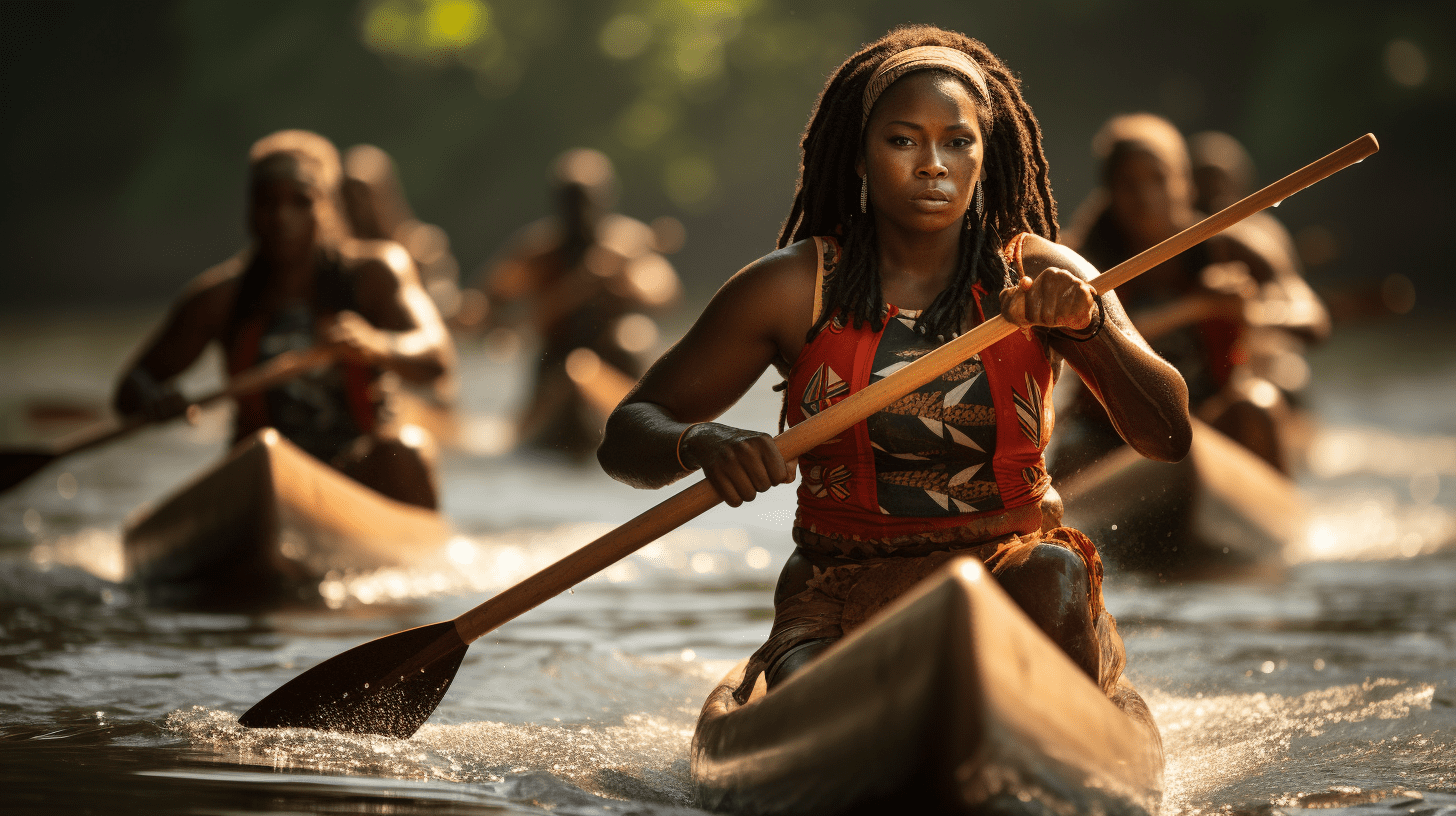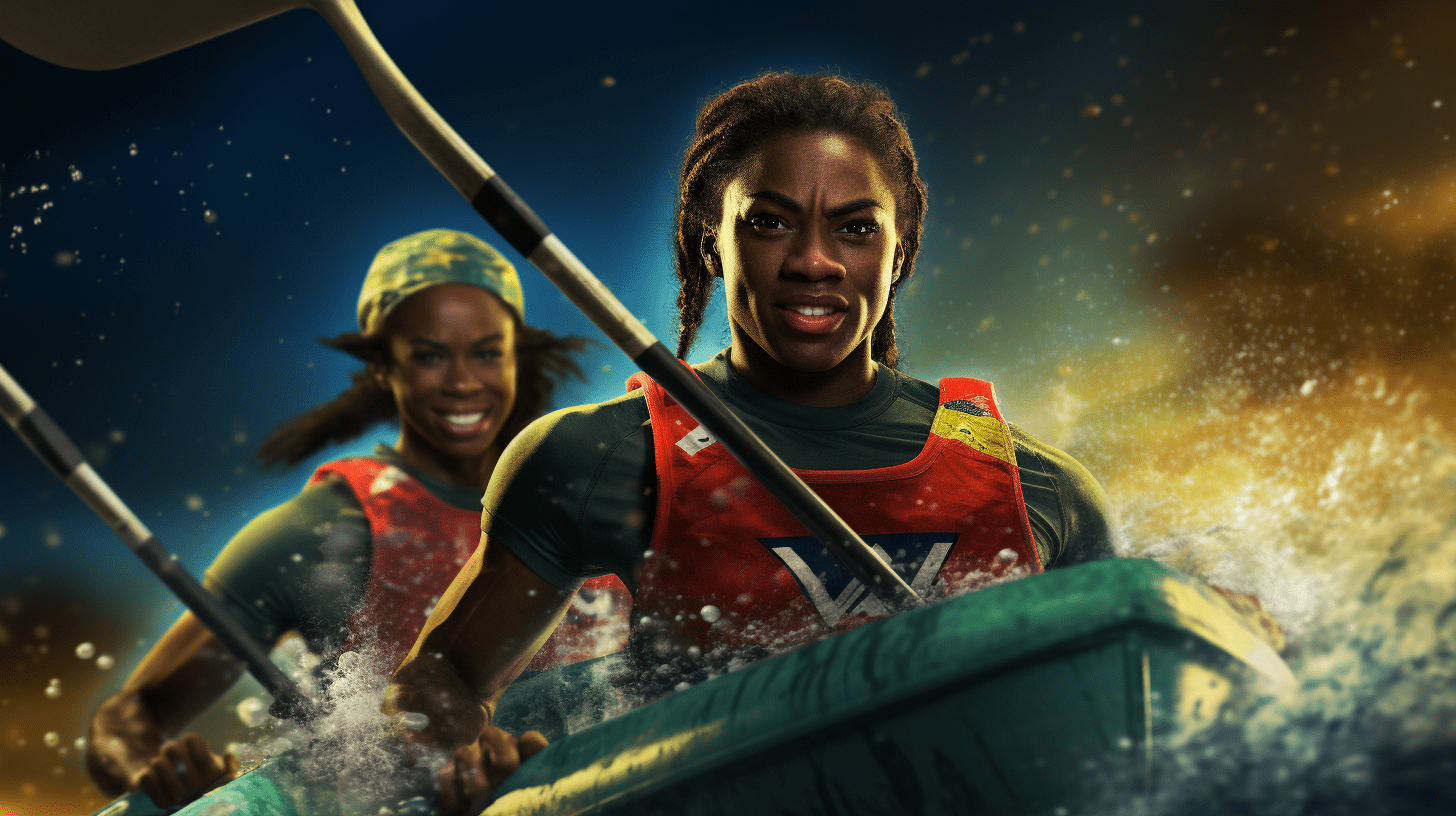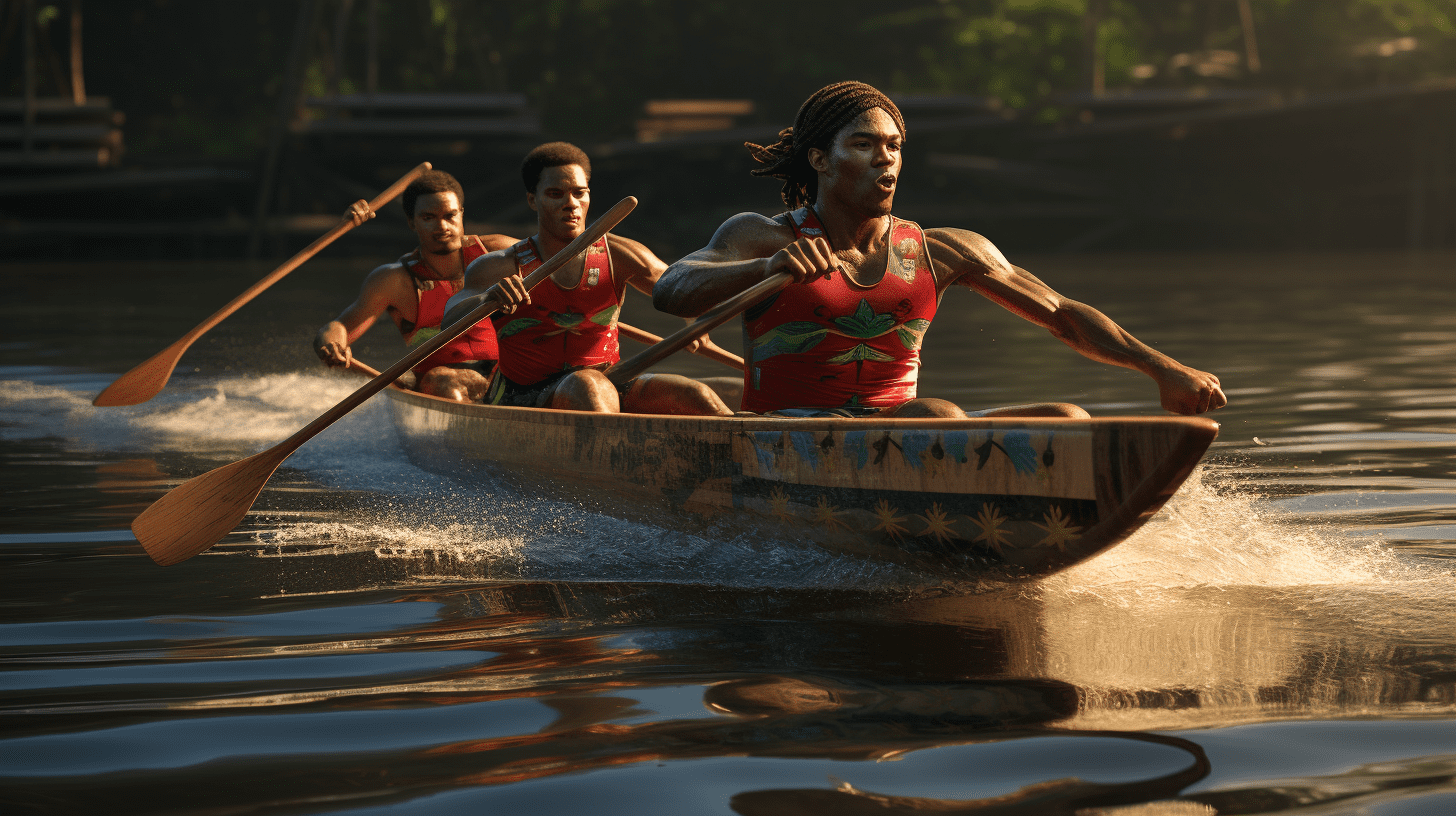- Home
- Wiki
- Learning Center
- Canoeing Betting Explained: Odds, Markets, and Winning Tips
Canoeing Betting Explained: Odds, Markets, and Winning Tips
- 1Canoeing Fundamentals
- 2Mastering Canoeing Wagers
- 3Types of Bets in Canoeing
- 4The Most Prestigious and High-Stakes Canoeing Events
- 5Factors for Betting Strategy Across Boat Types
- 6How Different Weather Conditions and Water Currents Affect Canoeing Competitions
- 7Examples of Betting on Canoeing
- 8Pros and Cons of Betting on Canoeing
- 9Conclusion
Canoeing, one of the oldest forms of waterborne transport, has, over time, transformed from a simple mode of transport to a thrilling and competitive sport. With its rich history and exhilarating races, it was only a matter of time before fans worldwide sought more than just the thrill of watching; they desired to participate in another form - betting. Just like with any other sport, canoeing has its betting dynamics, which come with their nuances and excitement.

In this article, we dive deep into the world of canoeing betting. From understanding the odds and navigating various markets to equipping you with winning tips, we aim to offer a comprehensive guide for newcomers and seasoned betters. Whether you’re a hardcore canoeing enthusiast or a betting fan looking for new adventures, this guide promises to navigate you through the calm and the rapids of canoeing bets. So, grab your paddle and let's set forth on this journey!
Canoeing Fundamentals
Before diving into the mechanics of betting, it's crucial to understand the basics of canoeing itself. An informed bet is always better than a wild guess, and knowledge about the sport can give you a distinct advantage.
Types of Canoeing:
Sprint Canoeing: Takes place on calm water, and competitors race to the finish line in the shortest time possible. Races can vary in distance, typically ranging from 200 meters to 1000 meters.
Slalom Canoeing: A technical and timed form of canoeing on a rapid river. Paddlers have to navigate through a series of gates without touching them.
Marathon Canoeing: Long-distance races that can range from 10km to 30km or more. It tests the stamina and strategy of the paddler.
Types of Vessels:
- Canoe (C): Paddlers kneel in the boat using a single-bladed paddle.
- Kayak (K): Paddlers sit in the boat with their legs in front and use a double-bladed paddle.
Team Variations:
- Solo (C1 or K1): One paddler.
- Doubles (C2 or K2): Two paddlers.
- Four (C4 or K4): Four paddlers.
Major Competitions:
- Olympic Games: Held every four years, featuring sprint and slalom events.
- World Championships: Organized annually by the International Canoe Federation (ICF) in different categories.
- Continental Championships: Regional competitions such as the European Canoe Championships.
- National Championships: Country-specific events that often serve as qualifiers for international competitions.
Physical and Technical Demands:
Canoeing, especially at competitive levels, demands strength, endurance, technique, and strategy. Understanding an athlete's training regimen, past performances, and current physical condition can be invaluable when placing a bet.
Environmental Factors:
The condition of the water (choppy, calm, fast-flowing, etc.), weather, and the course layout play a massive role in race outcomes. For instance, a strong wind can significantly affect a sprint canoe race, while a water current can change the dynamics of a slalom event.
By understanding these fundamentals, bettors can gain a solid foundation to make informed decisions and predictions in the canoeing betting arena.

Mastering Canoeing Wagers
Once you've grasped the basics of canoeing, the next step is to understand the intricacies of betting within this sport. Betting on canoeing can be a rewarding experience, especially if you know the different wagering options available and how to navigate them effectively.
Understanding Odds:
- Decimal Odds: Popular in Europe and Canada, they represent the total amount you'll get back for a winning bet, including your stake. For example, if the odds are 1.50 and you bet $10, you'll get $15 if you win.
- Fractional Odds: Common in the UK, they indicate your potential profit relative to your stake. So, 3/1 odds mean for every $1 you wager, you win $3.
- Moneyline Odds: Popular in the US, a positive number (e.g., +200) indicates how much profit you make on a $100 bet, while a negative number (e.g., -150) shows how much you need to stake to make $100.
Betting Markets:
- Outright Winner: Betting on which individual or team will win a particular event.
- Podium Finish: Betting on a paddler or team to finish in the top three positions.
- Head-to-Head: Betting on one competitor to finish ahead of another, irrespective of the overall race position.
- Over/Under: A bet on whether the total number of points/goals (or another benchmark) will be over or under a specific figure set by the bookmaker.
- Prop Bets: Bets on specific occurrences within the event, like whether a specific paddler will hit a gate in slalom canoeing.
Research and Analysis:
- Past Performance: Analyze the track record of the competitors. A consistent performer might be a safer bet.
- Training and Preparation: Some athletes might give insights into their training through interviews or social media, which can be valuable information.
- Current Form: An athlete's performance in recent events can indicate their current form and potential performance in an upcoming race.
- Environmental Adaptability: Some paddlers excel in certain conditions over others. Research how they perform in various environments.
Strategies for Betting:
- Diversify Bets: Instead of putting all your money on one outcome, diversify your wagers to spread risk.
- Bankroll Management: Determine a specific amount you're willing to wager and stick to it. It helps in minimising potential losses.
- Stay Informed: Always keep yourself updated with the latest news about the sport, competitors, and any other relevant information.
- Value Betting: This strategy involves identifying and betting on events where you believe the bookmaker's odds do not reflect the actual likelihood of the outcome.
Types of Bets in Canoeing
In the world of canoeing betting, there's a diverse array of wagering options to cater to beginners and seasoned punters. Understanding each type is critical to formulating a successful betting strategy.
Winner Bets:
- Definition: This is a straightforward bet where you predict which individual or team will win a particular event or race.
- Strategy: Consider the form, history, and conditions of the event. Look for patterns in past performances and any external factors that may impact the result.
Head-to-Head Bets:
- Definition: Here, you're betting on which of two paddlers or teams will perform better in a specific event, regardless of their overall position.
- Strategy: Instead of comparing an athlete to the entire field, you only compare them to one competitor. Research the history between the two competitors and consider factors like form, injuries, and any psychological elements that might play a role.
Bets 1-3:
- Definition: This is a wager on whether a particular paddler or team will finish within the top three positions in an event.
- Strategy: Look for consistent performers or athletes on the rise recently. Sometimes, this can be a safer bet than choosing an outright winner, especially in highly competitive events.
Handicap Betting:
- Definition: Bookmakers give one competitor a virtual advantage (or disadvantage) to level the playing field. For instance, if one paddler is given a -2.5-second handicap, they need to win by more than 2.5 seconds for bets on them to pay out.
- Strategy: This is ideal when there's a clear favourite. Consider the form and history of competitors, and assess whether the handicap is justified or presents an opportunity.
Over/Under Bets:
- Definition: This involves wagering whether a particular statistic (like the number of gate touches in a slalom) will be over or under a figure set by the bookmaker.
- Strategy: Research past events and performances to understand what's typical for the statistics. Take note of any conditions or factors that might impact the outcome.
Futures and Outrights:
- Definition: These are bets placed on events that will happen in the future, such as who will win a championship or a series of races.
- Strategy: Consider longer-term factors like season performance, training, and trends. Since these bets are typically made well in advance, they can offer attractive odds.
Live Betting:
- Definition: Allows you to place bets in real-time as the event unfolds. The odds change dynamically based on what's happening in the race.
- Strategy: Quick decision-making is crucial. Watch the event closely and look for shifts in momentum or conditions that could impact the outcome.
- By acquainting with these betting types and accompanying strategies, you'll be well-prepared to navigate the exciting waters of canoeing wagering.

The Most Prestigious and High-Stakes Canoeing Events
The world of canoeing sports offers a myriad of events, from regional challenges to global championships. These competitions not only elevate the status of the athletes but also serve as significant events for the betting community due to their high stakes and comprehensive visibility. Here are some of the most prestigious canoeing events that fans and betters alike eagerly await:
Olympic Games
- Description: The pinnacle of many athletes' careers, the Olympic Games, held every four years, features both sprint and slalom canoeing events.
- Betting Appeal: The global viewership and participation of the world's best athletes make this a prime event for placing bets. The sheer prestige of the event means athletes are at their peak performance, making races both thrilling and unpredictable.
World Championships
- Description: Organized annually by the International Canoe Federation (ICF), these championships cover different categories of canoeing, including sprint, slalom, marathon, and more.
- Betting Appeal: With top athletes from all over the world, the competition is fierce, offering various betting opportunities, from outrights to prop bets.
Canoe Sprint World Cup
- Description: An annual series of races in the sprint discipline, taking place in various locations globally.
- Betting Appeal: The recurring nature of the World Cup events allows betters to analyse performance across different races, potentially identifying patterns and informed betting opportunities.
Canoe Slalom World Cup
- Description: Similar to its sprint counterpart, this is an annual series of races, but for the slalom discipline.
- Betting Appeal: Given the technical nature of slalom races, the unpredictable nature of water currents and the skill of navigating gates make for exciting betting scenarios.
- Continental Championships
- Description: Regional competitions, like the European Canoe Championships or the Asian Canoe Championships, are significant events in their respective continents.
- Betting Appeal: These championships often serve as qualifying events for world competitions, making the stakes high. Regional rivalries and the inclusion of local athletes can also add a layer of excitement for local bettors.
World Marathon Championships
- Description: An annual event organised by the ICF, focusing on the marathon discipline of canoeing.
- Betting Appeal: The endurance and strategy required for these long-distance races create varied outcomes, offering an exciting betting landscape.
World Wildwater Championships
- Description: Dedicated to the wild water discipline, this event showcases athletes navigating natural rivers with strong currents and challenging terrains.
- Betting Appeal: The unpredictable nature of wild waters combined with the athlete's skills creates a dynamic betting environment, where understanding the athletes and the specific river course can be invaluable.
These events, with their rich history and fierce competition, provide bettors with numerous opportunities throughout the year. Familiarising oneself with the athletes, understanding the nuances of each event, and staying updated on current happenings are crucial for anyone looking to participate in betting on these prestigious canoeing competitions.
Factors for Betting Strategy Across Boat Types
Each boat type in canoeing presents its unique challenges, and when formulating a betting strategy, it's crucial to understand the dynamics of each boat and its races. Here's a look at the factors to consider for different boat types:
Solo (C1 or K1)
Athlete's Strength and Stamina: In solo races, the athlete's physical condition plays a pivotal role. They alone bear the responsibility of manoeuvring and propelling the boat.
- Technical Skills: Solo races, especially in slalom, demand exceptional technique. An athlete's past performance in manoeuvring through gates without penalties can be a good predictor.
- Consistency: Solo athletes who consistently perform well across various conditions are often safer bets.
Doubles (C2 or K2)
- Team Coordination: The synergy between the two paddlers is essential. They need to paddle and manoeuvre in harmony.
- Combined Strength: While individual strength is vital, how well the duo complements each other in power and technique is a deciding factor.
- Past Partnership Performances: Check if the duo has raced together before. Established teams have better coordination than newly formed ones.
Four (C4 or K4)
- Team Dynamics: With four paddlers, the coordination becomes even more critical. The team should work as a single unit.
- Positional Strategy: Each paddler might have a specific role, like setting the pace or steering. Knowing the strengths of each team member and their position can offer insights.
- Team's Adaptability: With more members, it's crucial how quickly a team can adapt to unexpected challenges like a missed stroke or change in water currents.
General Factors Across Boat Types
- Boat's Design and Weight: The design of a boat can influence its speed and manoeuvrability. Lighter boats are typically faster but may be more challenging to control.
- Environmental Suitability: Some boats are better suited for specific conditions. For example, in rough waters, a kayak (K) with its enclosed design might fare better than a canoe (C).
- Race Length and Type: Longer races test endurance, while shorter ones focus on sprinting ability. Slalom races demand technical prowess, while sprint races test raw speed.
- Preparation and Training: Knowing how a team or individual has prepared can be invaluable. Teams may share insights on their training regimes or any new strategies they want to implement.
- Injury and Health: Especially in team boats, the health and fitness level of even a single team member can impact overall performance.
- Historical Data: Look into the past performances of individuals or teams in specific events or conditions. For example, certain athletes might consistently perform well in specific courses or weather conditions.
By considering these factors tailored to each boat type, bettors can refine their strategies, increasing their chances of placing winning wagers.
How Different Weather Conditions and Water Currents Affect Canoeing Competitions
The unpredictability of weather and water conditions in canoeing can be both an athlete's friend and foe. Understanding these dynamics is crucial for both the participants and those betting on the outcomes of the competitions. Here’s an in-depth look at how various conditions impact canoeing events:
Wind
- Effect: Wind can slow down or speed up a boat, depending on its direction. Crosswinds can make steering difficult, especially for lightweight boats.
- Impact on Betting: Athletes or teams known for their ability to paddle effectively in windy conditions or those with excellent steering skills might have an edge.
Temperature
- Effect: Cold temperatures can lead to muscle stiffness, reducing paddling efficiency. Conversely, high temperatures can lead to fatigue, especially in longer races.
- Impact on Betting: Consider the athlete's adaptability to extreme temperatures. Athletes or teams from regions with similar climatic conditions as the competition might have a slight advantage.
Rain
- Effect: Rain can affect visibility and make boat surfaces slippery. It can also contribute to changing water levels and currents during prolonged downpours.
- Impact on Betting: Athletes with experience in rainy conditions or those who've demonstrated solid technical skills might fare better.
Water Currents and Turbulence
- Effect: Rapid currents can increase the challenge of steering and maintaining the desired path. Turbulence can also make it difficult to maintain a steady pace and balance.
- Impact on Betting: In slalom events, where precision is crucial, athletes with a history of solid performances in turbulent waters might have an edge.
Water Levels
- Effect: Low water levels can expose obstacles or make specific pathways more challenging. High water levels, on the other hand, can intensify currents.
- Impact on Betting: Athletes' prior experience in varying water levels and their ability to quickly adapt to changing conditions can influence outcomes.
Sun Glare
- Effect: Bright sunlight reflecting off the water can hinder an athlete's visibility, making it challenging to navigate or spot obstacles.
- Impact on Betting: Athletes using protective gear, such as quality sunglasses or visors, might be better equipped to handle such conditions. Past performance in similar lighting conditions can also be an indicator.
Water Temperature
- Effect: Cold water can reduce an athlete’s reaction time and increase muscle fatigue. On the other hand, warm water can lead to quicker exhaustion, especially in long-distance races.
- Impact on Betting: Athletes' training regimes and past performances in similar water temperatures can offer insights.
Air Quality
- Effect: Pollution or high pollen counts can affect respiratory efficiency, impacting an athlete’s stamina.
- Impact on Betting: Athletes with respiratory issues or those unaccustomed to certain air qualities might be disadvantaged.
Understanding these environmental factors and their effects on canoeing competitions provides a more nuanced perspective when placing bets. It also emphasises the importance of pre-race research and staying updated with real-time weather and water conditions during the event.

Examples of Betting on Canoeing
Betting in Nigeria often takes place in Nigerian Naira (₦). Here are some hypothetical examples to illustrate how one might bet on canoeing events using Nigerian naira:
Winner Bets
Example: You believe that Athlete A will win a specific canoeing event. The odds are given as 5:1.
If you place ₦1,000 on Athlete A and they win, your potential profit is ₦5,000. Your total payout would be ₦6,000 (your initial stake + your profit).
Head-to-Head Bets
Example: Athlete A and Athlete B are competing. The bookmaker offers odds of 2:1 for Athlete A to finish ahead of Athlete B.
If you wager ₦2,000 on Athlete A and they finish ahead of Athlete B, you'd receive ₦4,000 profit, making a total of ₦6,000.
Over/Under Bets
Example: The bookmaker sets an over/under time for a race at 90 seconds. You can bet either over or under this time.
If you place ₦3,000 on "under" at odds of 1.5:1 and the winning time is 88 seconds, your profit would be ₦4,500, and you'd receive ₦7,500.
Handicap Betting
Example: Athlete A is given a -3.5-second handicap against Athlete B. This means Athlete A needs to win by more than 3.5 seconds for bets on them to pay out.
If you bet ₦5,000 on Athlete A with this handicap at odds of 3:1, and Athlete A wins by 4 seconds, you'd gain a profit of ₦15,000, resulting in a ₦20,000 payout.
Futures and Outrights
Example: At the start of the season, you predict Athlete C will be the overall champion. The odds are 10:1.
If you wager ₦1,500 on this and Athlete C becomes the champion, you'd earn a profit of ₦15,000, and your total return would be ₦16,500.
Live Betting
Example: Midway through a race, you see that Athlete D is performing exceptionally well, and the live odds for them to win are 4:1.
If you quickly bet ₦2,500 and Athlete D wins, your profit would be ₦10,000, giving you ₦12,500.
Note: It's important to remember that the actual odds and payouts can vary based on the bookmaker, the event, and other factors. Always check the specific terms and odds offered before placing a bet.
Pros and Cons of Betting on Canoeing
Pros
- Niche Market: Since canoeing is less mainstream than football or basketball, dedicated fans with in-depth knowledge have an advantage over casual bettors.
- Variety of Events: With different canoeing disciplines (sprint, slalom, marathon, etc.) and boat types (C1, K2, etc.), there's a wide range of betting opportunities.
- Seasonal Opportunities: With events like the World Championships, World Cups, and the Olympic Games, there are high-stakes competitions throughout the year.
- Predictable Venues: Many canoeing events occur in established venues with known water conditions, allowing for research and analysis.
- Live Betting: As with many sports, canoeing offers opportunities for live betting, allowing punters to place bets based on real-time observations.
- Less Manipulation: Being a niche sport, there needs to be more incentive and fewer instances of match-fixing compared to more enormous sports.
Cons
- Limited Coverage: Mainstream media might not cover canoeing as extensively as other sports, making research more challenging.
- Unpredictable Conditions: Natural factors like water currents, wind, and weather can introduce unpredictability into races, making outcomes harder to forecast.
- Fewer Bookmakers: Not all betting platforms might offer odds on canoeing events, limiting the choices for bettors.
- Less Frequent Races: Compared to football, where teams might play weekly, canoeing athletes or teams may have fewer races, reducing frequent betting opportunities.
- Variable Athlete Participation: Top athletes might only participate in some events, especially if they are smaller competitions, which can affect the predictability of results.
- Requires Specialized Knowledge: To bet successfully on canoeing, a deeper understanding of the sport, athletes, and conditions is essential, which might be challenging for casual bettors.
- Smaller Betting Community: The canoeing betting community might be smaller, making it harder to find forums or groups to discuss strategies and tips.
Conclusion
In summary, the dynamic shifts within the sports betting industry challenge bookmakers and bettors alike. As technology advances and new markets emerge, all stakeholders must remain informed and adaptable.
While uncertainties will always be a part of the game, those approaching these challenges with knowledge and foresight will be best positioned for success. Stay tuned for more insights and updates as we navigate this ever-evolving landscape together.
FAQ
Our platform is designed to provide users with insightful information, updates, and tools related to the sports betting industry. We aim to be a trusted resource for both novices and experts alike.
We strive to update our content regularly, with significant industry news and trends being added weekly. However, for real-time updates and live events, it's best to check our 'Latest News' section.
Absolutely! We have a comprehensive beginner's guide that covers the basics of betting, understanding odds, and making informed decisions.
Our dedicated research team verifies all the information from reputable sources, and we regularly review our content to ensure its accuracy and relevance.
Yes, our reviews are unbiased and based on a combination of user feedback and our team's in-depth analysis. We look into factors like reliability, user experience, odds, and promotions while reviewing.
Currently, we have a mobile-optimized website. We are in the process of developing a mobile application, and it will be launched soon. Stay tuned for updates!
We value our user community's feedback and queries. You can contact us through our 'Contact Us' page, and we'll do our best to address your questions promptly.

Comments0